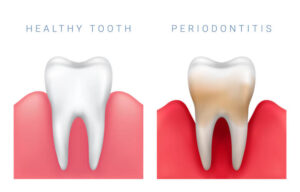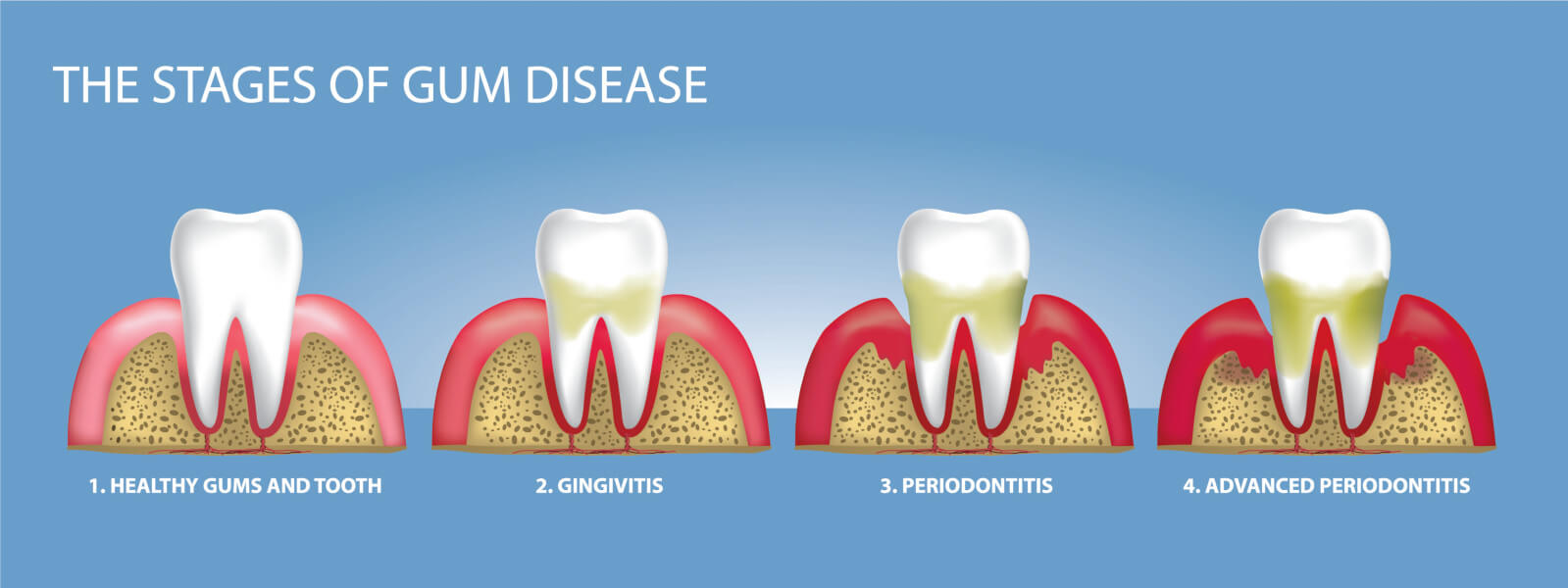Periodontitis is an advanced form of gum disease or serious gum infection that causes damage to oral soft tissue. Left untreated, periodontal disease can result in the loosening of the teeth, tooth loss, and even destroying the bone under the gums.

Causes of Periodontal Disease
The root cause of all periodontal disease is poor oral hygiene. Without proper oral hygiene, plaque can form and harden into tartar and fill with bacteria to cause the onset of gum disease known as gingivitis. Left untreated, gingivitis leads to a more serious form of gum disease known as periodontitis as the plaque, tartar, and bacteria cause pockets to develop between the teeth and gums.
How Do You Know if You Have Periodontitis?
The early stages of periodontitis can pass by undetected as symptoms may be mild. That said, it is important to catch the disease as early as possible as advanced periodontitis can cause long term complications to not only oral and dental health but also a patient’s overall physical health.
If you notice that your gums are red or swollen, sore or inflamed, or if they bleed with brushing or flossing, this may be a sign of early gum disease. Other more advanced symptoms include receding of gums where the tooth root becomes more visible, pain with chewing, shifting or loosened teeth, pus between the teeth and gums, newly formed gaps or changes in bite, and even inflammatory responses throughout the body.
Regular dental checkups and professional teeth cleanings by your dentist, along with good daily oral hygiene practices can help prevent the onset of gum disease and catch any symptoms before they become serious.
If you are suffering from any of these symptoms, contact our dental clinic today to prevent the progression of the disease!
How Do You Know if You Have Periodontitis?
Stages of Periodontitis
The onset of periodontitis is preceded by a milder form of gum disease known as gingivitis. At this stage, a thorough and professional teeth cleaning is often enough to halt the progression into periodontal disease.

Early Periodontal Disease
Once gums begin to recede and pockets begin to form between the teeth and gums, the disease as progressed from gingivitis into periodontitis. The pockets will harbor harmful bacteria and may begin to attack the bone tissue that can result in some bone loss.
Moderate Periodontal Disease
If not treated, periodontal disease continues to progress where bone loss becomes more significant. This can lead to loosening of some teeth with increased pain and bleeding. Gums will continue to recede further leading to increased tooth sensitivity.
Advanced Periodontal Disease
In the advanced stages, periodontitis continues to attack the surrounding tissue until the gums, bones, and supportive tissue are damaged. This may include the connective tissue that holds the teeth in place, resulting in tooth loss. Pain can be severe, along with bad breath and foul taste in the mouth from infection.
Periodontal Disease Treatment
Professional Deep Cleaning
At the earlier stages, deep cleaning techniques by your dentist may be enough to prevent the progression of periodontitis. Common deep cleaning procedures for the treatment of gum disease include scaling and root planing. Scaling is used to scrape of the hardened plaque from above the gum line, whereas root planing smooths out the tooth root to remove the bacteria and promote the reattachment of gums to the tooth.
Antibiotic Medications
Available in the form of a mouthwash, gel, or oral tablet/capsule, antibiotic medications may be used to help treat stubborn infections that persist even with professional deep cleaning. Sometimes, antibiotic gelatin-filled chips may be inserted into the pockets that have been formed between the teeth and gums as an additional measure after root planing.
Common surgical options for advanced periodontal disease treatment include flap surgery and bone and tissue grafts. Flap surgery involves surgical lifting of the gum tissue under anesthesia to thoroughly clean the roots of the teeth. The gums will then be stitched back into place.
Bone and tissue grafts are surgical procedures that help regenerate any bone or gum tissue that was destroyed as a result of gum disease. Your dentist may also recommend guided tissue regeneration, pocket reduction surgery, or bone surgery.